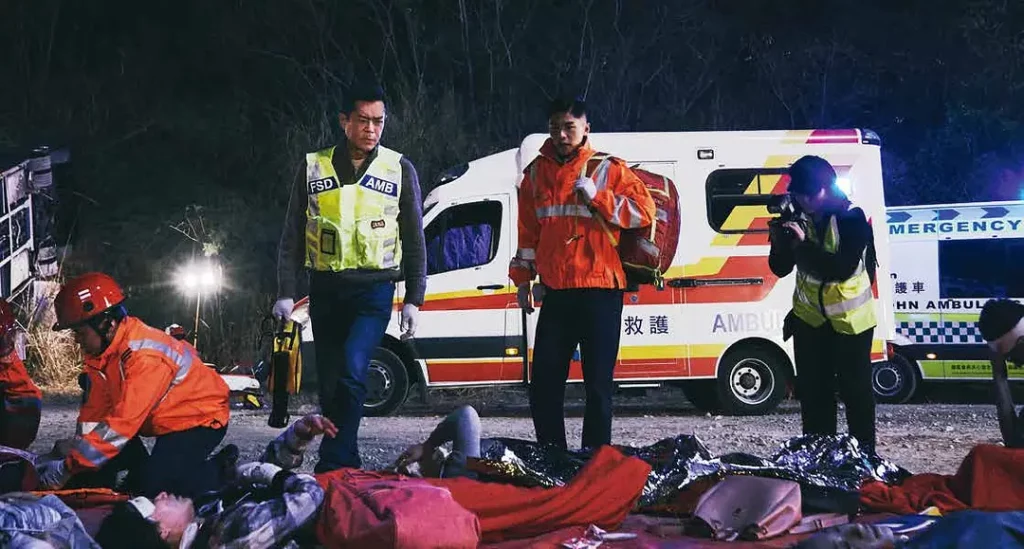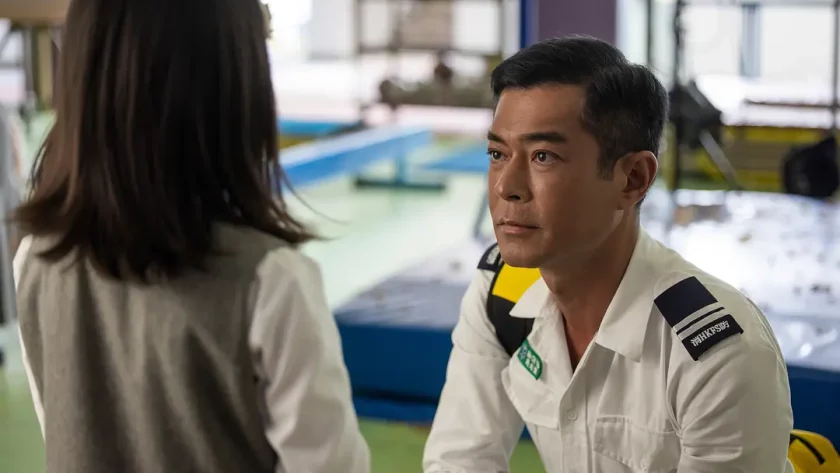London East Asia Film Festival 2023 returns to London with a diverse programme from East and Southeast Asia, including international and UK premieres.
Euan Toh reviews Vital Signs, a drama depicting the clashes between a veteran ambulanceman and his new partner, a young go-getter on the fast track up the bureaucratic ladder.
It is a tale as old as time, campy like a rhyme. A veteran paramedic (Louis Koo) crosses paths with a hotshot young up-and-comer too focused on the protocols of the job, and looking past the actual vocation at hand. This film pulls out the buddy cop playbook of misunderstandings and reconciliation, but I personally didn’t care much about the plot after the first act. Some say that this film is a thriller, but I won’t even come close to placing Vital Sign in that genre. Nothing about it is particularly thrilling, suspenseful or uncomfortable. The movie plays out more like a straight interpersonal melodrama with a Hong Kong flare – nothing too deep.
That said, it is commendable the film chose to shine a light on the hectic world of paramedics. Koo would state in the roundtable discussion that took place after the LEAFF screening the inspiration for producing such a film was through observation of emergency services during the turbulent time of the pandemic. You can tell that the cast (including the child actors) are all putting their minds to the performance as a mark of respect for the real-world heroes. The central conflict, although overdone in the world of storytelling, did strike a humorous chord in me. I guarantee you that as a former member of the uniformed public services, there are two things always at the back of the minds of my colleagues: the quest for promotions, and the fear of complaints. In the most ironic of circumstances, Vital Sign makes a narrative based on this occupational anxiety which, despite it being shallow, breathes life into the uniformed personnel without undermining the film’s tribute to emergency services.
All the incident response scenes in Vital Sign are shot in quite a dynamic way. You can hear the pulse of a victim through the score, and the over-the-shoulder tracking shots draw you into the organised chaos. There’s a certain flare and pace to this which strengthens the film’s editing, thereby making even the most generic of story beats and expected cross-cuts feel alive. No, it still is not thrilling or suspenseful, but at least the film does in fact have some life in its individual part. These scenes are the most deft in the film, putting the audience into the perspective of first responders rather than the victims.

The film is also fairly blatant in its political commentary on Hong Kong, a city perceived by its characters as hopeless. There are social problems like illegal immigration, cronyism and mass emigration. What’s jarring, however, is that without context, the problems in Hong Kong don’t seem to hold much significance. There’s nothing egregiously damning being shown, but the characters remember to tell you the city is dying. It mainly feels like a writing flaw of ‘telling’ instead of ‘showing’. The film wants you to desperately buy into the idea Hong Kong can unite together as a community through their struggles. When in reality, what you are watching never really sells you the idea that there is a desperate need to come together.
To give a quick example of this problem, the conflict presented in the film is the wish for the protagonist to emigrate with his daughter to give her a better life in Canada. Yet there were no indications life is miserable for the family unit at all when this problem arises. If anything, the daughter was never exposed to any of the grimy parts of Hong Kong. The film is written with the intention of highlighting that the separation of families through emigration causes more pain than good, and that the grass is not always greener on the other side. Yet there is no point of comparison because we don’t even see the problems in their original neighbourhood.
Interestingly, after the screening at LEAFF, Louis Koo had a roundtable discussion where a question was asked about the influence of new wave and Korean cinema on Hong Kong. Koo gave a reply in Cantonese that evoked a few laughs from the audience before the translator explained the film was influenced by Korean TV, especially the point about how a character always dies from a tragic medical condition. Perhaps this sums up how it feels to watch the film, like a long episode of a Netflix K-drama. It feels emotionally cheap, and perhaps this may be effective while watching it, but as a piece of art that gives back to the community, it fails to make a mark.




